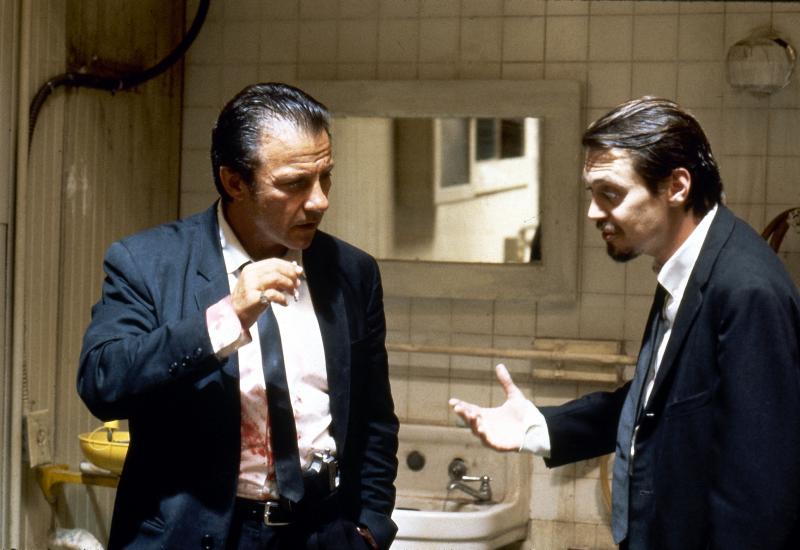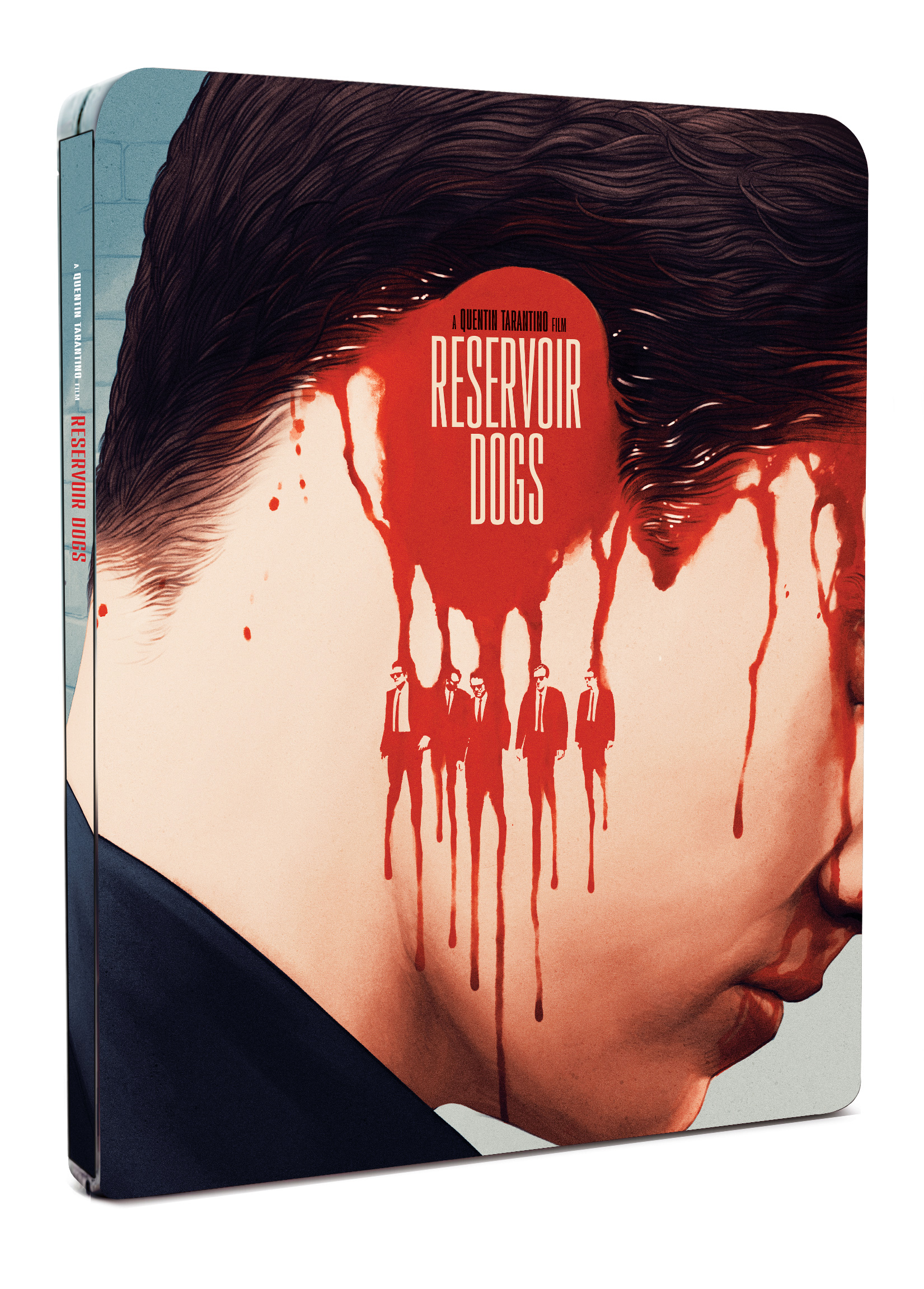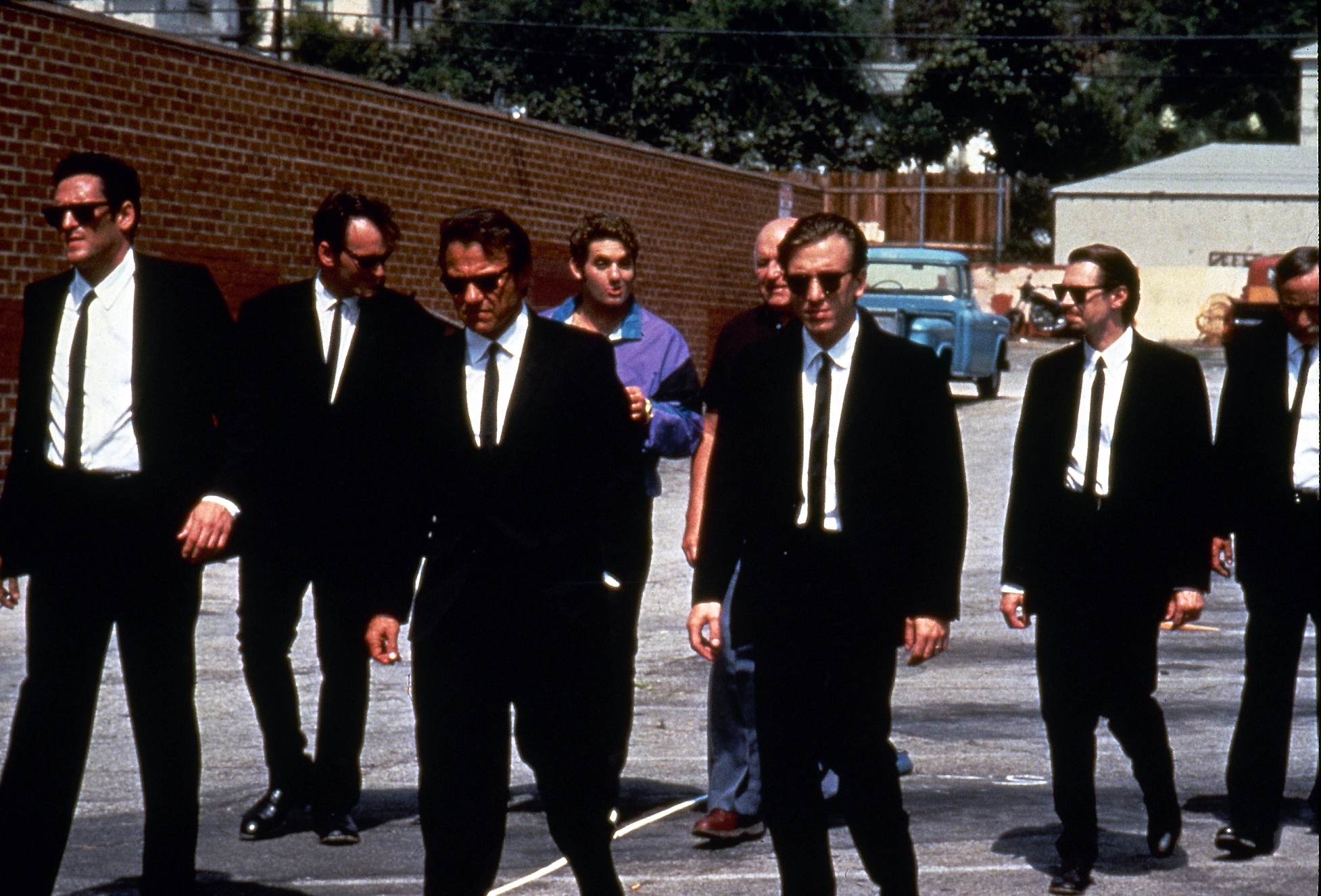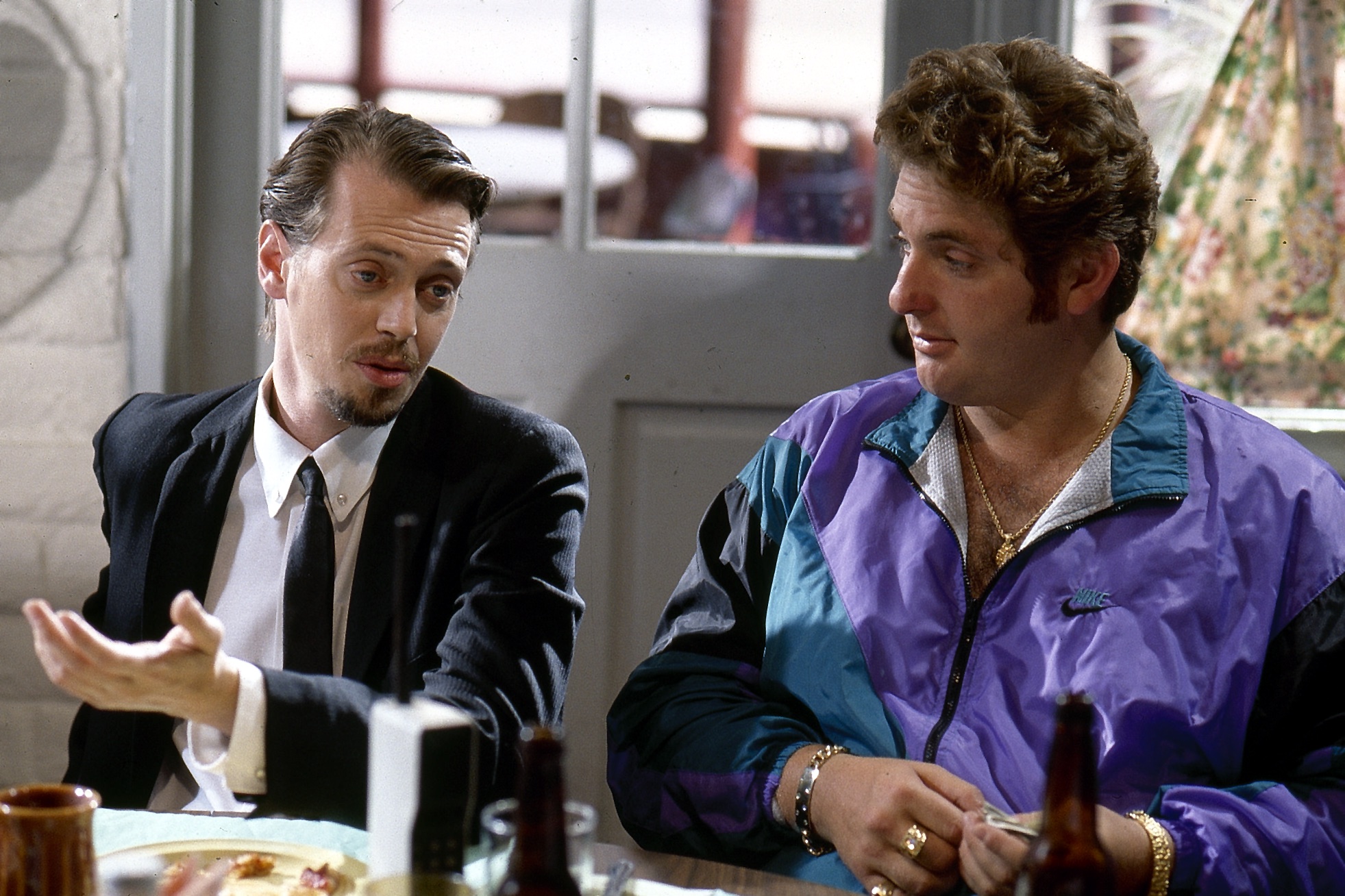Blu-ray: Reservoir Dogs | reviews, news & interviews
Blu-ray: Reservoir Dogs
Blu-ray: Reservoir Dogs
Tarantino's debut's sly technique and visceral violence still grip in 4K

Quentin Tarantino’s is the first voice you hear in Reservoir Dogs (1992), riffing on Madonna’s “Like a Virgin”. The gang of fellow robbers we see gathered round his character all talk like versions of the obsessive ex-video store clerk at times, rapping pop culture opinion and relishing pungent language.
Soon Steven Wright’s doleful DJ is cueing a Seventies song, the gang leave their diner meeting in immediately iconic slow-motion and, after a fade to credits black, we hear Mr Orange (Tim Roth) scream before we see his shirt soaked in blood, supported by Mr White (Harvey Keitel) as they flee a heist which will gradually go wrong during artful flashbacks. Dialogue and violence make successive, complementary impacts, grabbing attention.
 Executive producer Monte Hellman – director of Two-Lane Blacktop (1971) and a pair of existential Jack Nicholson Westerns – was the draw when the NME’s late, much missed film editor Gavin Martin asked me to Reservoir Dogs’ first UK screening. First impressions were of a then rare, welcome throwback to Seventies Hollywood’s penchant for rangy conversation, and gruelling, sardonic violence immediately comparable only to Goodfellas (1990).
Executive producer Monte Hellman – director of Two-Lane Blacktop (1971) and a pair of existential Jack Nicholson Westerns – was the draw when the NME’s late, much missed film editor Gavin Martin asked me to Reservoir Dogs’ first UK screening. First impressions were of a then rare, welcome throwback to Seventies Hollywood’s penchant for rangy conversation, and gruelling, sardonic violence immediately comparable only to Goodfellas (1990).
Thirty years and eight films later, Tarantino has become baggy and baroque, his fetishes, from feet to insistent use of the N-word, brazenly familiar. Reservoir Dogs remains his most concise display. Authoritatively borrowing plot elements from Ringo Lam’s Hong Kong cop film City On Fire (1987) and its chronological shuffles from Kubrick’s sweaty heist noir The Killing (1956), it achieves movie-bred authenticity. Though its characters don’t talk much like contemporary criminals, they convincingly compound the argot of 100 crime films. Lawrence Tierney as burly, gravel-voiced boss Joe Cabot talks like it’s still the Forties, when he starred as a nihilistic killer in The Devil Thumbs a Ride (1947). The gang of sharp-suited, self-styled pros he takes paternal charge of occupy a similar twilight zone, for all their modern, rhythmic profanity.
On a $1.5 million budget, Tarantino relied on a prime cast led by Keitel (just clawing his way back from career purgatory) and Roth (barely known in the States). “Betcha a big Lee Marvin fan, aren’t ya?” Mr Blonde (Michael Madsen) asks Mr White, who laughs in recognition. But Keitel’s abrasiveness, tender affection for his gut-shot young comrade and primal howl when he realises he’s a cop, Roth’s rasping and gasping in a pool of blood, and the then unknown Madsen’s cool, genuine menace are all more serious and less knowing than the heightened, cinematically self-conscious acting of subsequent Tarantinos (Jackie Brown apart). With Chris Penn on board too (pictured bottom, right with Steve Buscemi), Method macho abounds. (The only, small, female speaking part, Nina Siemaszko’s cop colleague of Roth’s character, was cut.) The warehouse where the heist’s survivors gather largely keeps Reservoir Dogs to a single cheap set, often filmed in wide-angle, long-shot tableaus emphasising its theatrical nature. But with this script and cast at his disposal, Tarantino’s dreamily smooth, wrong-footing direction also pumps every frame with value.
The warehouse where the heist’s survivors gather largely keeps Reservoir Dogs to a single cheap set, often filmed in wide-angle, long-shot tableaus emphasising its theatrical nature. But with this script and cast at his disposal, Tarantino’s dreamily smooth, wrong-footing direction also pumps every frame with value.
The first time you see Madsen’s Mr Blonde dance round a tethered cop as Stealers Wheel’s “Stuck in the Middle with You” plays on the radio, feinting with his razor till he saws off his ear, you’re horrified by how far he’ll go. But the rest of the scene is conceived with equal originality: Blonde steps out into a sunny, quiet LA street, the sounds of ordinary life going on nearby, retrieves a petrol can, then re-enters the pop-soundtracked nightmare to slosh the cop with the liquid, the camera jerking in verité agitation; he flicks a lighter you’re now sure he’ll use, only for Orange’s forgotten gun to go off, and Blonde to slump in the frame’s distant rear. The scenes between scenes, the transitions and undercurrents, work as hard as Mr Blonde’s razor. The revelation, an hour into its 99 minutes, that Orange is really Freddy, the gang’s cop traitor, triggers Reservoir Dogs’ most atypical flashback, as Freddy is tutored in his undercover mission by his black cop boss Hideaway (Randy Brooks). During their dialogue in another diner, Tarantino films Roth talking from over Brooks’ shoulder, slants angles (just as the bleeding-out, static Roth lies on the warehouse’s most interesting, sloping feature) and tracks in on close-ups, anything to keep a classic two-shot conversation visually jumping, even as the gliding edit coolly secretes this restlessness. When Hideaway provides an anecdote to add convincing life to Freddy’s alias, Tarantino then moves from them prepping on a rooftop – LA’s blue sky suddenly enormous in this claustrophobic film – to a huge, graffitied street backdrop, to Freddy telling the story to Joe’s gang, to a tense dramatisation of this cooked-up scenario. This minor, multifarious scene incidentally gives a rich, sketched portrait of Tarantino’s hometown, and suggestively muddies the film’s racial politics.
The scenes between scenes, the transitions and undercurrents, work as hard as Mr Blonde’s razor. The revelation, an hour into its 99 minutes, that Orange is really Freddy, the gang’s cop traitor, triggers Reservoir Dogs’ most atypical flashback, as Freddy is tutored in his undercover mission by his black cop boss Hideaway (Randy Brooks). During their dialogue in another diner, Tarantino films Roth talking from over Brooks’ shoulder, slants angles (just as the bleeding-out, static Roth lies on the warehouse’s most interesting, sloping feature) and tracks in on close-ups, anything to keep a classic two-shot conversation visually jumping, even as the gliding edit coolly secretes this restlessness. When Hideaway provides an anecdote to add convincing life to Freddy’s alias, Tarantino then moves from them prepping on a rooftop – LA’s blue sky suddenly enormous in this claustrophobic film – to a huge, graffitied street backdrop, to Freddy telling the story to Joe’s gang, to a tense dramatisation of this cooked-up scenario. This minor, multifarious scene incidentally gives a rich, sketched portrait of Tarantino’s hometown, and suggestively muddies the film’s racial politics.
Such immediately masterful, immensely resourceful technique underpins Reservoir Dogs’ still vivid achievement. The US and Cannes woke up with Pulp Fiction (1994), but I watched its more superficial pastiche with creeping disappointment. Banned on home video in the UK until 1995 for its violence, Reservoir Dogs meanwhile went back to work as a cult, midnight cinema hit. It still stands apart from its many imitators and Tarantino’s later career, limber with youthful intent.
The 4K transfer means Roth’s shirt is redder than ever on this 30th anniversary edition, but the extras are minimal, with critics reassessing the film, a 2006 mini-documentary, and weak psychological profiles of the Dogs. Only deleted scenes – more Roth-Brooks, and filling in Mr White’s past – are worthwhile.
- Reservoir Dogs is on limited edition 4K UHD + Blu-ray SteelBook now
- More film reviews on theartsdesk
rating
Explore topics
Share this article
The future of Arts Journalism
You can stop theartsdesk.com closing!
We urgently need financing to survive. Our fundraising drive has thus far raised £49,000 but we need to reach £100,000 or we will be forced to close. Please contribute here: https://gofund.me/c3f6033d
And if you can forward this information to anyone who might assist, we’d be grateful.

Subscribe to theartsdesk.com
Thank you for continuing to read our work on theartsdesk.com. For unlimited access to every article in its entirety, including our archive of more than 15,000 pieces, we're asking for £5 per month or £40 per year. We feel it's a very good deal, and hope you do too.
To take a subscription now simply click here.
And if you're looking for that extra gift for a friend or family member, why not treat them to a theartsdesk.com gift subscription?
more Film
 Blu-ray: Finis Terrae
Bleak but compelling semi-documentary, filmed on location in Brittany
Blu-ray: Finis Terrae
Bleak but compelling semi-documentary, filmed on location in Brittany
 Oslo Stories Trilogy: Sex review - sexual identity slips, hurts and heals
A quietly visionary series concludes with two chimney sweeps' awkward sexual liberation
Oslo Stories Trilogy: Sex review - sexual identity slips, hurts and heals
A quietly visionary series concludes with two chimney sweeps' awkward sexual liberation
 Sorry, Baby review - the healing power of friendship in the aftermath of sexual assault
Eva Victor writes, directs and stars in their endearing debut feature
Sorry, Baby review - the healing power of friendship in the aftermath of sexual assault
Eva Victor writes, directs and stars in their endearing debut feature
 Blu-ray: Who Wants to Kill Jessie?
Fast-paced and visually inventive Czech comedy
Blu-ray: Who Wants to Kill Jessie?
Fast-paced and visually inventive Czech comedy
 Oslo Stories Trilogy: Love review - freed love
Gay cruising offers straight female lessons in a heady ode to urban connection
Oslo Stories Trilogy: Love review - freed love
Gay cruising offers straight female lessons in a heady ode to urban connection
 Beating Hearts review - kiss kiss, slam slam
Romance and clobberings in a so-so French melodrama
Beating Hearts review - kiss kiss, slam slam
Romance and clobberings in a so-so French melodrama
 Materialists review - a misfiring romcom or an undercooked satire?
Writer-director Celine Song's latest can't decide what kind of film it is
Materialists review - a misfiring romcom or an undercooked satire?
Writer-director Celine Song's latest can't decide what kind of film it is
 theartsdesk Q&A: actor Leonie Benesch on playing an overburdened nurse in the Swiss drama 'Late Shift'
The Guildhall-trained German star talks about the enormous pressures placed on nurses and her admiration for British films and TV
theartsdesk Q&A: actor Leonie Benesch on playing an overburdened nurse in the Swiss drama 'Late Shift'
The Guildhall-trained German star talks about the enormous pressures placed on nurses and her admiration for British films and TV
 Freakier Friday review - body-swapping gone ballistic
Lindsay Lohan and Jamie Lee Curtis's comedy sequel jumbles up more than their daughter-mother duo
Freakier Friday review - body-swapping gone ballistic
Lindsay Lohan and Jamie Lee Curtis's comedy sequel jumbles up more than their daughter-mother duo
 Eight Postcards from Utopia review - ads from the era when 1990s Romania embraced capitalism
Radu Jude's documentary is a mad montage of cheesy TV commercials
Eight Postcards from Utopia review - ads from the era when 1990s Romania embraced capitalism
Radu Jude's documentary is a mad montage of cheesy TV commercials
 The Kingdom review - coming of age as the body count rises
A teen belatedly bonds with her mysterious dad in an unflinching Corsican mob drama
The Kingdom review - coming of age as the body count rises
A teen belatedly bonds with her mysterious dad in an unflinching Corsican mob drama

Add comment